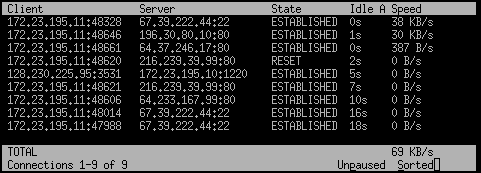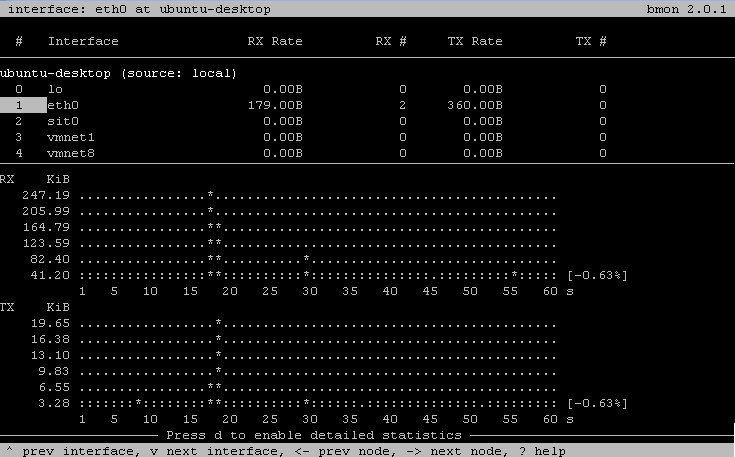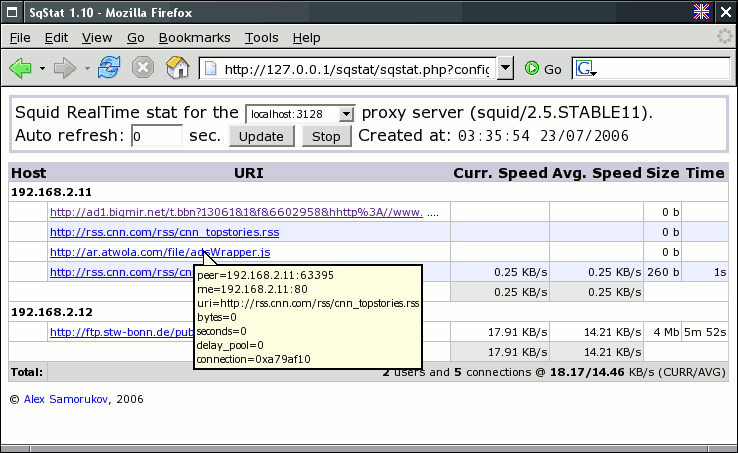¡Esta es una revisión vieja del documento!
Tabla de Contenidos
Utilidades de Red
Conectividad
Forzar el modo ethernet
Ejemplo, forzar a 100M Full duplex sin autonegociacion a la eth0
ethtool -s eth0 speed 100 duplex full autoneg off
Conectarse a redes Wi Fi
Primero bajamos el servicio de Network Manager si es que lo tenemos instalado
service NetworkMananger stop
Ejecutamos un scan sobre la interfaz para ver si encontró alguna red
iwlist wlan0 scan
Establecemos el ESSID y el AP
iwconfig wlan0 essid Wireless iwconfig wlan0 ap 00:A0:C5:77:FC:7E
Si tiene clave
iwconfig wlan0 key PASSWORD
Ejecutamos iwconfig para ver si tomo todo y despues a tomar ip
dhclient wlan0
Script para parsear el iwlist scan
Salida de ejemplo
Name Address Quality Channel Encryption wifi_1 01:23:45:67:89:AB 100 % 11 WPA v.1 wifi_2 01:23:45:67:89:AC 76 % 11 WEP wifi_3 01:23:45:67:89:AD 51 % 11 Open wifi_4 01:23:45:67:89:AE 50 % 11 WPA v.1 wifi_5 01:23:45:67:89:AF 43 % 4 Open wifi_6 01:23:45:67:89:AG 43 % 4 WPA v.1
Script : iwlist wlan0 scan | iwlistparse.py
#!/usr/bin/env python # # iwlistparse.py # Hugo Chargois - 17 jan. 2010 - v.0.1 # Parses the output of iwlist scan into a table import sys # You can add or change the functions to parse the properties of each AP (cell) # below. They take one argument, the bunch of text describing one cell in iwlist # scan and return a property of that cell. def get_name(cell): return matching_line(cell,"ESSID:")[1:-1] def get_quality(cell): quality = matching_line(cell,"Quality=").split()[0].split('/') return str(int(round(float(quality[0]) / float(quality[1]) * 100))).rjust(3) + " %" def get_channel(cell): return matching_line(cell,"Channel:") def get_encryption(cell): enc="" if matching_line(cell,"Encryption key:") == "off": enc="Open" else: for line in cell: matching = match(line,"IE:") if matching!=None: wpa=match(matching,"WPA Version ") if wpa!=None: enc="WPA v."+wpa if enc=="": enc="WEP" return enc def get_address(cell): return matching_line(cell,"Address: ") # Here's a dictionary of rules that will be applied to the description of each # cell. The key will be the name of the column in the table. The value is a # function defined above. rules={"Name":get_name, "Quality":get_quality, "Channel":get_channel, "Encryption":get_encryption, "Address":get_address, } # Here you can choose the way of sorting the table. sortby should be a key of # the dictionary rules. def sort_cells(cells): sortby = "Quality" reverse = True cells.sort(None, lambda el:el[sortby], reverse) # You can choose which columns to display here, and most importantly in what order. Of # course, they must exist as keys in the dict rules. columns=["Name","Address","Quality","Channel","Encryption"] # Below here goes the boring stuff. You shouldn't have to edit anything below # this point def matching_line(lines, keyword): """Returns the first matching line in a list of lines. See match()""" for line in lines: matching=match(line,keyword) if matching!=None: return matching return None def match(line,keyword): """If the first part of line (modulo blanks) matches keyword, returns the end of that line. Otherwise returns None""" line=line.lstrip() length=len(keyword) if line[:length] == keyword: return line[length:] else: return None def parse_cell(cell): """Applies the rules to the bunch of text describing a cell and returns the corresponding dictionary""" parsed_cell={} for key in rules: rule=rules[key] parsed_cell.update({key:rule(cell)}) return parsed_cell def print_table(table): widths=map(max,map(lambda l:map(len,l),zip(*table))) #functional magic justified_table = [] for line in table: justified_line=[] for i,el in enumerate(line): justified_line.append(el.ljust(widths[i]+2)) justified_table.append(justified_line) for line in justified_table: for el in line: print el, print def print_cells(cells): table=[columns] for cell in cells: cell_properties=[] for column in columns: cell_properties.append(cell[column]) table.append(cell_properties) print_table(table) def main(): """Pretty prints the output of iwlist scan into a table""" cells=[[]] parsed_cells=[] for line in sys.stdin: cell_line = match(line,"Cell ") if cell_line != None: cells.append([]) line = cell_line[-27:] cells[-1].append(line.rstrip()) cells=cells[1:] for cell in cells: parsed_cells.append(parse_cell(cell)) sort_cells(parsed_cells) print_cells(parsed_cells) main()
Sacado de : http://bbs.archlinux.org/viewtopic.php?id=88967
Analisis de volcados tcpdump
Tcpdstat
Written by Kenjiro Cho, tcpdstat is a powerful tool that performs an in-depth protocol breakdown by bytes and packets. It further displays average and maximum transfer rates, IP flow information, and packet size distribution. Dave Dittrich applied several tweaks the tool to support a broader range of protocols and services, and to report more details about flow rates.
Here is an example output (of Dave's enhanced version):
DumpFile: trace.pcap
FileSize: 98876.89MB
Id: 200703011241
StartTime: (anonymized)
EndTime: (anonymized)
TotalTime: 7216.13 seconds
TotalCapSize: 96826.91MB CapLen: 1514 bytes
# of packets: 134347439 (96826.91MB)
AvgRate: 113.10Mbps stddev:47.96M PeakRate: 260.92Mbps
### IP flow (unique src/dst pair) Information ###
# of flows: 1612801 (avg. 83.30 pkts/flow)
Top 10 big flow size (bytes/total in %):
33.6% 3.2% 2.2% 1.5% 1.4% 1.0% 1.0% 0.9% 0.8% 0.8%
### IP address Information ###
# of IPv4 addresses: 480065
Top 10 bandwidth usage (bytes/total in %):
34.4% 34.4% 3.3% 3.3% 3.0% 2.7% 2.3% 1.8% 1.5% 1.5%
### Packet Size Distribution (including MAC headers) ###
< <<<
[ 32- 63]: 20839652
[ 64- 127]: 38798140
[ 128- 255]: 3947049
[ 256- 511]: 3746280
[ 512- 1023]: 5675556
[ 1024- 2047]: 61340762
>>>>
### Protocol Breakdown ###
< <<<
protocol packets bytes bytes/pkt
------------------------------------------------------------------------
[0] total 134347439 (100.00%) 101530372750 (100.00%) 755.73
[1] ip 134347439 (100.00%) 101530372750 (100.00%) 755.73
[2] tcp 118172509 ( 87.96%) 97361936181 ( 95.89%) 823.90
[3] ftpdata 18640 ( 0.01%) 16529412 ( 0.02%) 886.77
[3] ftp 72372 ( 0.05%) 4697330 ( 0.00%) 64.91
[3] ssh 13849679 ( 10.31%) 11113777353 ( 10.95%) 802.46
[3] telnet 9007 ( 0.01%) 1526445 ( 0.00%) 169.47
[3] smtp 2133471 ( 1.59%) 1447293494 ( 1.43%) 678.38
[3] name 23 ( 0.00%) 1426 ( 0.00%) 62.00
[3] dns 35071 ( 0.03%) 7071657 ( 0.01%) 201.64
[3] http(s) 25043480 ( 18.64%) 30677552254 ( 30.22%) 1224.97
[3] http(c) 16165378 ( 12.03%) 2182851897 ( 2.15%) 135.03
[3] kerb5 370 ( 0.00%) 30610 ( 0.00%) 82.73
[3] pop3 82382 ( 0.06%) 26718043 ( 0.03%) 324.32
[3] sunrpc 30 ( 0.00%) 3002 ( 0.00%) 100.07
[3] ident 5107 ( 0.00%) 322074 ( 0.00%) 63.07
[3] nntp 1262 ( 0.00%) 292679 ( 0.00%) 231.92
[3] epmap 209144 ( 0.16%) 12909976 ( 0.01%) 61.73
[3] netb-se 404237 ( 0.30%) 47178014 ( 0.05%) 116.71
[3] imap 125983 ( 0.09%) 100889454 ( 0.10%) 800.82
[3] bgp 482 ( 0.00%) 43139 ( 0.00%) 89.50
[3] ldap 7131 ( 0.01%) 1434769 ( 0.00%) 201.20
[3] https 2941177 ( 2.19%) 1802114169 ( 1.77%) 612.72
[3] ms-ds 245214 ( 0.18%) 24263111 ( 0.02%) 98.95
[3] rtsp 1023246 ( 0.76%) 691696863 ( 0.68%) 675.98
[3] ldaps 2828 ( 0.00%) 209272 ( 0.00%) 74.00
[3] socks 7883 ( 0.01%) 1340672 ( 0.00%) 170.07
[3] kasaa 13348 ( 0.01%) 1124944 ( 0.00%) 84.28
[3] mssql-s 309786 ( 0.23%) 20411848 ( 0.02%) 65.89
[3] squid 51381 ( 0.04%) 14079861 ( 0.01%) 274.03
[3] ms-gc 1865 ( 0.00%) 493682 ( 0.00%) 264.71
[3] ms-gcs 2034 ( 0.00%) 481178 ( 0.00%) 236.57
[3] hotline 6 ( 0.00%) 682 ( 0.00%) 113.67
[3] realaud 19784 ( 0.01%) 13197979 ( 0.01%) 667.10
[3] icecast 390203 ( 0.29%) 291651836 ( 0.29%) 747.44
[3] gnu6346 6324 ( 0.00%) 1048473 ( 0.00%) 165.79
[3] gnu6348 342 ( 0.00%) 26047 ( 0.00%) 76.16
[3] gnu6349 14 ( 0.00%) 2767 ( 0.00%) 197.64
[3] gnu6350 4 ( 0.00%) 732 ( 0.00%) 183.00
[3] irc6666 7 ( 0.00%) 434 ( 0.00%) 62.00
[3] irc6667 1379 ( 0.00%) 196155 ( 0.00%) 142.24
[3] irc6668 2 ( 0.00%) 124 ( 0.00%) 62.00
[3] irc6669 9 ( 0.00%) 666 ( 0.00%) 74.00
[3] napster 21 ( 0.00%) 1344 ( 0.00%) 64.00
[3] irc7000 7 ( 0.00%) 824 ( 0.00%) 117.71
[3] http-a 129807 ( 0.10%) 71136838 ( 0.07%) 548.02
[3] other 54862568 ( 40.84%) 48787331392 ( 48.05%) 889.26
[2] udp 13069221 ( 9.73%) 3895596348 ( 3.84%) 298.07
[3] name 18 ( 0.00%) 1989 ( 0.00%) 110.50
[3] dns 1799081 ( 1.34%) 264263480 ( 0.26%) 146.89
[3] kerb5 100 ( 0.00%) 25812 ( 0.00%) 258.12
[3] sunrpc 581 ( 0.00%) 57157 ( 0.00%) 98.38
[3] ntp 50387 ( 0.04%) 4534933 ( 0.00%) 90.00
[3] epmap 17 ( 0.00%) 1824 ( 0.00%) 107.29
[3] netb-ns 148619 ( 0.11%) 14736588 ( 0.01%) 99.16
[3] netb-se 1272 ( 0.00%) 328673 ( 0.00%) 258.39
[3] ms-ds 8 ( 0.00%) 883 ( 0.00%) 110.38
[3] kazaa 29 ( 0.00%) 3546 ( 0.00%) 122.28
[3] mssql-s 44 ( 0.00%) 3832 ( 0.00%) 87.09
[3] mcast 7216682 ( 5.37%) 1943012688 ( 1.91%) 269.24
[3] realaud 459195 ( 0.34%) 273532235 ( 0.27%) 595.68
[3] halflif 81 ( 0.00%) 5890 ( 0.00%) 72.72
[3] starcra 45 ( 0.00%) 6367 ( 0.00%) 141.49
[3] everque 9 ( 0.00%) 1351 ( 0.00%) 150.11
[3] unreal 1066 ( 0.00%) 93951 ( 0.00%) 88.13
[3] quake 20 ( 0.00%) 1860 ( 0.00%) 93.00
[3] other 3384119 ( 2.52%) 1394472416 ( 1.37%) 412.06
[2] icmp 3105709 ( 2.31%) 272840221 ( 0.27%) 87.85
[2] frag 30903 ( 0.02%) 25672129 ( 0.03%) 830.73
>>>>
Ref.:http://matthias.vallentin.net/2007/01/examining-and-dissecting-tcpdumplibpcap.html
Firewall
IPTState
IPTState is a top-like interface to your netfilter connection-tracking table. Using iptstate you interactively watch where traffic crossing your netfilter/iptables firewall is going, sort by various criteria, limit the view by various criteria
Sniffers y mediciones
Network Grep - ngrep
Muestra y busca paquetes. Ngrep se esfuerza por proveer de la mayoría de características comunes del “grep” de GNU, aplicándolas a la capa de network ({“network layer”} del modelo de referencia OSI). ngrep es consciente de la presencia de pcap y permite usar expresiones regulares que concuerden con el “payload” ( o sea la carga, el cuerpo, y _no_ los encabezados) de los paquetes. Actualmente reconoce TCP, UDP, e ICMP sobre Ethernet, PPP, SLIP e interfaces nulas {“null interfaces”}, y comprende la lógica de un filtro “bpf” de la misma manera que herramientas más comunes de sniffing como tcpdump y snoop.
Un posteo interesante en un blog : http://seguridadyredes.nireblog.com/post/2010/02/24/esas-pequenas-utilidades-ngrep
Tcptrack
tcptrack is a sniffer which displays information about TCP connections it sees on a network interface. It passively watches for connections on the network interface, keeps track of their state and displays a list of connections in a manner similar to the unix 'top' command. It displays source and destination addresses and ports, connection state, idle time, and bandwidth usage. The following screenshot explains a lot:
La sintaxis es similar a la de tcpdump
# tcptrack -i eth0 port 80 # tcptrack -i eth0 host 192.168.2.110 and port 8080 #tcptrack -i eth0 src or dst 74.125.47.138 or src or dst 74.125.47.139 or src or dst 74.125.47.101 or src or dst 74.125.47.138 or src or dst 208.117.252.210 or src or dst 74.125.47.102 or src or dst s2.youtube.com or src or dst youtube.com or src or dst 208.117.252.210 or src or dst 208.117.252.22 or src or dst 208.117.252.167 or src or dst 208.117.252.22 or src or dst www.youtube.com or src or dst 208.117.252.228 or src or dst 208.117.252.23 or src or dst 74.125.47.101 or src or dst 208.117.252.159 or src or dst 74.125.47.102 or src or dst 208.117.252.18
Bmon
bmon is a portable bandwidth monitor with multiple input methods and output modes. A set of architecture specific input modules provide the core with the listof interfaces and their counters. The core stores this counters and provides rate estimation including a history over the last 60 seconds, minutes, hours and days to the output modules which output them according to the configuration.
Para instalarlo
apt-get install bmon
Sqstat
SqStat is a script which allows to look through active squid users connections. It use cachemgr protocol to get information from squid proxy server
Hydra
A very fast network logon cracker which support many different services
Currently this tool supports: TELNET, FTP, HTTP, HTTPS, HTTP-PROXY, SMB, SMBNT, MS-SQL, MYSQL, REXEC, RSH, RLOGIN, CVS, SNMP, SMTP-AUTH, SOCKS5, VNC, POP3, IMAP, NNTP, PCNFS, ICQ, SAP/R3, LDAP2, LDAP3, Postgres, Teamspeak, Cisco auth, Cisco enable, AFP, Subversion/SVN, Firebird, LDAP2, Cisco AAA (incorporated in telnet module).
For HTTP, POP3, IMAP and SMTP, several login mechanisms like plain and MD5 digest are supported.




